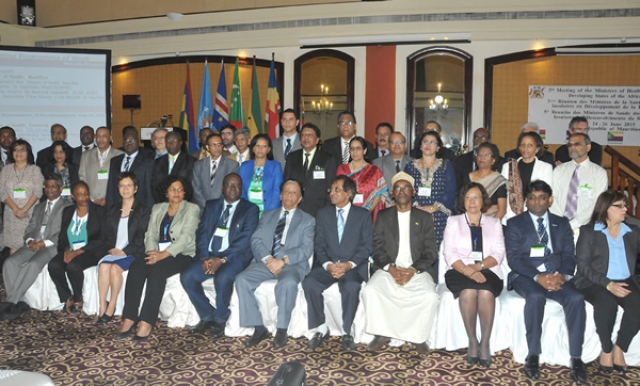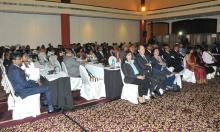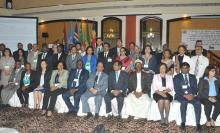Strong partnerships needed to tackle health challenges faced by Small Island Developing States in the African Region
 Mauritius, 24 June 2015 – Health Ministers from Small Island Developing States (SIDS) in the African Region have begun a meeting today in Mauritius to take stock of the health of their people and chart a way forward on possible approaches and actions that will promote sustainable health development.
Mauritius, 24 June 2015 – Health Ministers from Small Island Developing States (SIDS) in the African Region have begun a meeting today in Mauritius to take stock of the health of their people and chart a way forward on possible approaches and actions that will promote sustainable health development.
The meeting, organized by the World Health Organization is attended by Health Ministers from Cape Verde, Comoros, Seychelles, Sao Tome & Principe, Mauritius, high ranking officials of the health ministry, representatives of the Indian Ocean Commission and public health experts.
In a message read on her behalf by Dr Francis Kasolo, Coordinator of the Country and Intercountry Support Unit, Dr Matshidiso Moeti, the WHO Regional Director for Africa, noted that although Small Island Developing States of the African Region have made progress in improving people’s health, much more needs to be done to address the inadequate skilled health workers, the increasing burden of non-communicable diseases; achieving compliance with the International Heath Regulations (IHR), among others. She underscored the importance of strong multisectoral collaboration and partnerships involving civil society, donors and other sectors to address the unique health challenges facing Small Island Developing States of the African Region.
Refering to health security and compliance with IHR, Dr Moeti said: “The impact of outbreaks and emergencies on SIDS could have severe consequences on the population due to the unique nature of these countries. It is therefore important to ensure that priority is placed on issues of health security and emergencies in line with International Health Regulations”.
The Regional Director urged delegates to actively engage in issues related to the health consequences of climate change as the rise in sea level, extreme weather conditions including droughts and flooding, water and sanitation, waste management and sewage systems and the attendant risks of disease remain a challenge in most of the SIDS.
In his remarks, the Prime Minister of Mauritius, Rt Honourable Anerood Jugnauth noted that investment in health has paid rewarding dividends with improvements in average life expectancy, maternal and child health and a dramatic decrease in death and illness associated with waterborne and parasitic diseases. He however observed that the health gains of the past decades have been undermined by the prevalence of non-communicable diseases.
Echoing Dr Moeti’s remarks, the Prime Minister pointed out that SIDS are prone to environmental deterioration, climate change and natural disasters. He urged the delegates to adopt innovative ways to meet the challenges and develop networks to reinforce cooperation in health care.
The three-day meeting is aimed at reviewing progress made during the past few years and provide an important platform for deliberations on:
- Chronic non-communicable diseases – a leading cause of illness and death
- Health security and information sharing
- Introduction of Human papilloma virus vaccine
- Universal Health Coverage and
- Cooperation and partnership including discussions on common approach to addressing climate change.
In an effort to address the common health challenges faced by SIDS, the WHO Regional Office for Africa supported the establishment of a Regional SIDS forum in 2006 with membership from Cape Verde, Comoros, Mauritius, São Tome and Principe and Seychelles. This forum offers an opportunity for the SIDS to specifically address health related vulnerabilities, build resilience and sustainability. It also serves as a unique platform to galvanize partnerships for action on sustainable health development.
__________________________________
For further information please contact:
Dr Francis Kasolo Tel: +4724139983 Email: kasolof [at] who.int (kasolof[at]who[dot]int)
C. Boakye-Agyemang Tel: +4724139420 Email: boakyeagyemangc [at] who.int (boakyeagyemangc[at]who[dot]int)




